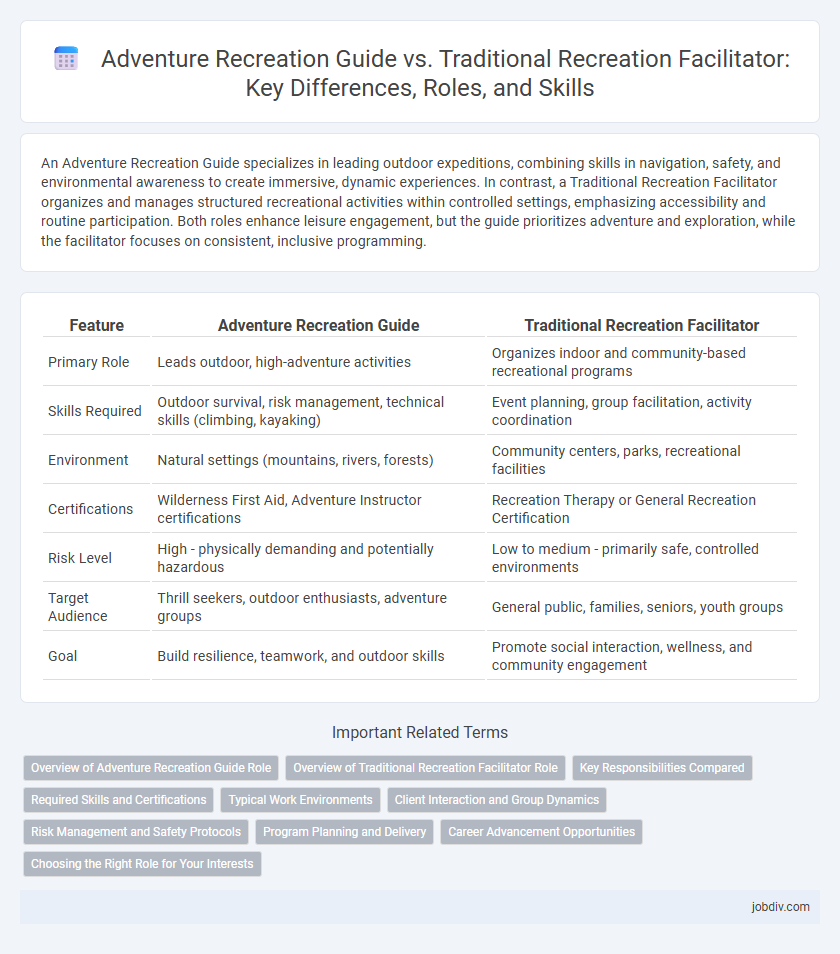An Adventure Recreation Guide specializes in leading outdoor expeditions, combining skills in navigation, safety, and environmental awareness to create immersive, dynamic experiences. In contrast, a Traditional Recreation Facilitator organizes and manages structured recreational activities within controlled settings, emphasizing accessibility and routine participation. Both roles enhance leisure engagement, but the guide prioritizes adventure and exploration, while the facilitator focuses on consistent, inclusive programming.
Table of Comparison
| Feature | Adventure Recreation Guide | Traditional Recreation Facilitator |
|---|---|---|
| Primary Role | Leads outdoor, high-adventure activities | Organizes indoor and community-based recreational programs |
| Skills Required | Outdoor survival, risk management, technical skills (climbing, kayaking) | Event planning, group facilitation, activity coordination |
| Environment | Natural settings (mountains, rivers, forests) | Community centers, parks, recreational facilities |
| Certifications | Wilderness First Aid, Adventure Instructor certifications | Recreation Therapy or General Recreation Certification |
| Risk Level | High - physically demanding and potentially hazardous | Low to medium - primarily safe, controlled environments |
| Target Audience | Thrill seekers, outdoor enthusiasts, adventure groups | General public, families, seniors, youth groups |
| Goal | Build resilience, teamwork, and outdoor skills | Promote social interaction, wellness, and community engagement |
Overview of Adventure Recreation Guide Role
An Adventure Recreation Guide specializes in leading outdoor activities such as rock climbing, whitewater rafting, and hiking, emphasizing risk management and environmental stewardship. Their role demands advanced knowledge of outdoor safety protocols, technical skills, and ability to navigate dynamic natural environments. Unlike traditional recreation facilitators who coordinate indoor or community-based activities, adventure guides focus on immersive, physically challenging experiences that require specialized training and certification.
Overview of Traditional Recreation Facilitator Role
Traditional Recreation Facilitators organize and lead community-based leisure activities, focusing on structured programs such as sports, arts and crafts, and social events. They emphasize accessibility and inclusivity, catering to diverse populations including seniors, youth, and individuals with disabilities. Their role involves designing safe, enjoyable environments that promote social interaction, wellness, and skill development through established recreational formats.
Key Responsibilities Compared
Adventure Recreation Guides specialize in leading outdoor activities such as rock climbing, white-water rafting, and zip-lining, ensuring participant safety through risk management and emergency response. Traditional Recreation Facilitators coordinate community-based programs like arts and crafts, sports leagues, and social events, focusing on participant engagement and resource management. Both roles require strong communication skills, but Adventure Guides demand advanced technical expertise and certifications related to outdoor and adventure activities.
Required Skills and Certifications
Adventure Recreation Guides require specialized skills such as wilderness survival, navigation, and risk management, alongside certifications like CPR, First Aid, and often advanced training in outdoor leadership or technical climbing. Traditional Recreation Facilitators typically emphasize skills in program planning, group management, and customer service, with certifications centered around general safety, fitness instruction, and sometimes community recreation credentials. The choice between these roles depends heavily on the environment, with Adventure Guides needing more intensive outdoor-specific qualifications compared to the broader skill set required for Traditional Facilitators.
Typical Work Environments
Adventure Recreation Guides predominantly work in outdoor settings such as national parks, wilderness areas, and adventure resorts, where they lead activities like hiking, kayaking, and rock climbing. Traditional Recreation Facilitators often operate in community centers, schools, and recreational facilities, planning and coordinating indoor and outdoor activities for diverse groups. The work environment for Adventure Guides tends to be more physically demanding and variable, while Traditional Facilitators usually have more structured and predictable venues.
Client Interaction and Group Dynamics
Adventure Recreation Guides excel in client interaction by fostering immersive experiences through hands-on leadership in dynamic environments, enhancing trust and group cohesion. Traditional Recreation Facilitators often emphasize structured activities with predefined roles, focusing on safety protocols and predictable outcomes, which may limit spontaneous group bonding. Understanding these distinct approaches aids in selecting the ideal facilitator to optimize engagement and social synergy within diverse recreational settings.
Risk Management and Safety Protocols
Adventure Recreation Guides prioritize dynamic risk assessment and implement specialized safety protocols tailored for high-risk outdoor activities like climbing, rafting, and zip-lining. Traditional Recreation Facilitators focus on managing safer, structured environments such as community centers or parks, emphasizing routine safety checks and standardized emergency procedures. Expertise in risk management for Adventure Guides includes advanced first aid, situational awareness, and adaptive decision-making, whereas Traditional Facilitators ensure compliance with general safety standards and participant supervision.
Program Planning and Delivery
Adventure recreation guides excel in dynamic program planning by integrating risk management with experiential learning activities tailored to diverse skill levels. Traditional recreation facilitators prioritize structured program delivery, emphasizing standardized activities and participant safety within controlled environments. Both roles require effective communication and adaptability, but adventure guides focus more on immersive, outdoor-based experiences while traditional facilitators maintain consistent indoor or community-centered programming.
Career Advancement Opportunities
Adventure Recreation Guides often access faster career advancement opportunities due to specialized skills in high-risk activities and certifications such as wilderness first aid, rock climbing, or whitewater rafting. Traditional Recreation Facilitators typically progress within community centers or schools, gaining expertise in program coordination and administration, which may lead to managerial roles. Both paths benefit from experience and leadership skills, but Adventure Guides often encounter unique leadership positions in outdoor and expedition companies sooner.
Choosing the Right Role for Your Interests
Selecting between an Adventure Recreation Guide and a Traditional Recreation Facilitator depends on your passion for outdoor challenges versus structured activities. Adventure Recreation Guides typically lead dynamic experiences like rock climbing, white-water rafting, or wilderness survival, requiring specialized skills and risk management training. Traditional Recreation Facilitators focus on organizing community-based programs, sports, and social events that emphasize inclusion, team-building, and accessibility, aligning well with those interested in program development and group engagement.
Adventure Recreation Guide vs Traditional Recreation Facilitator Infographic

 jobdiv.com
jobdiv.com